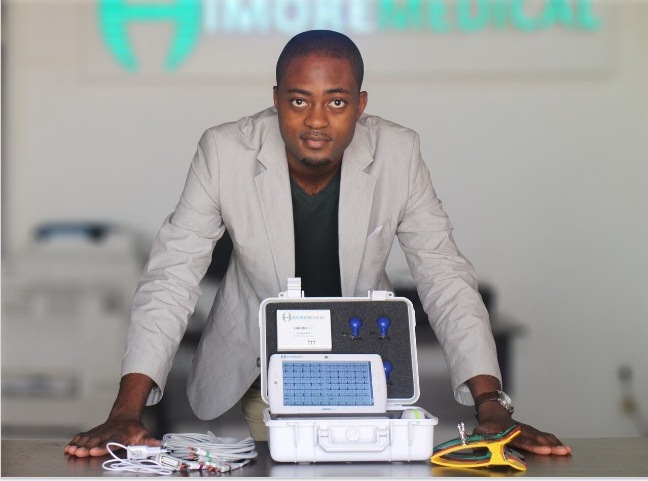Arthur Zang said the award has allowed him to measure himself against the best engineers in Africa. “I was pushed to the limits, and it has made me a better scientist and a better entrepreneur.”

Arthur Zang, the Cameroonian innovator who won this year’s entrepreneurial Africa Prize for Engineering Innovation
By TZ Business News Staff.
Two East Africans lost the British funded engineering innovation award at a contest in Dar es Salaam. A West African won the £25,000 (about Tsh. 81,400,000) entrepreneurial engineering innovation award given annually by the Royal Academy of Engineering of UK.
The award is given to the most ingenious African innovator who discovers a way to solve a serious African problem.
The Cameroonian innovator, Arthur Zang, won this year’s Africa Prize for Engineering Innovation for designing a heart-monitoring device he has called the Cardio-Pad, a device set to change the way people in Africa access treatment for heart disease.
The West African defeated three other award contestants in the four runners up who included Aijuka Edmand from Kampala Uganda, Felix Kimaru from Kenya and Matt Wainwright from South Africa.
Last year the award was taken by Dr. Askwar Hilonga of the Nelson Mandela African Institute of Science and Technology in Arusha, Tanzania for discovery of an affordable water purification system aimed at people in rural Africa. There was no contestant from Tanzania this time.
The Cardio-Pad which won the award this year at a voting ceremony in Dar es Salaam is a small tablet device that allows any medical professional to perform heart diagnostics at any location. The diagnostics, sent to a cardiologist via a mobile phone network can be interpreted in under 20 minutes. The innovator said he has received many orders from India already.
A document released by the Royal Academy of Engineering says one in two Africans over the age of 25 has undiagnosed hypertension, and an estimated 20 million Africans suffer from a cardiovascular disease. A further 80 million Africans are estimated to have abnormally high blood pressure, which can lead to heart failure.
Cardio-Pad can help discover, monitor or rule out heart conditions as a source of pain without expensive trips to cities where cardiologists are based. Cardiologists are often stationed in main cities, making heart diagnostics an expensive trip for millions of Africans living in rural areas.
Launched in 2014, the Prize aims to stimulate, celebrate and reward engineers who have developed innovations that will benefit Africans, the Royal Academy of Engineering said in a statement.
There were 12 shortlisted Africa Prize entrants from nine countries in sub-Saharan Africa but only four reached the finals in Dar es Salaam. The academy conducts the finals at the capital city of the previous year’s winning nation, which means the 2017 finals will be in Yaoundé, Cameroon.
The finalists presented a pitch on their innovations in front of an audience at the Kilimanjaro Hotel as a panel of judges listened. Zang talked about his Cardio-Pad, Eddie Aijuka from Uganda talked about his “Kamata” gadget, an electricity-theft-prevention device that attaches to each household power supply and alerts authorities and cuts off power supply when the power is tampered with.
Then Felix Kimaru from Kenya talked about his Totohealth innovation, a web-based network that supplies mothers and pregnant women with life-saving information and advice. Matt Wainwright from South Africa pitched about his Microgrid innovation, an electricity utility-in-a-box which speeds up rural electrification and reduces energy costs.
The audience voted during a wine break in the Mezzanine hotel lobby and the winner was announced back in conference hall. The award was presented to Arthur Zang by last year’s Prize winner, Dr Askwar Hilonga and handed over by the head judge, Mr. Malcolm Brinded, Chairman of Shell Foundation and Vice President of the British Energy institute. Shell funds the awards.
“Arthur’s technology is powerful and solves a real problem,” Dr. Hilonga said. “It touches the underserved communities, and is a tangible technology that Africa can be proud of – developed in Africa, for Africans.”
The Africa Prize for Engineering Innovation encourages talented sub-Saharan African engineers, from all disciplines, to develop local solutions to challenges in their communities, the Royal Academy of Engineering said in a statement. The Prize selects a shortlist of innovators from across the continent and provides training and mentoring to help turn engineers with incredible ideas into successful entrepreneurs.
“I was very impressed by Arthur Zang and his team, which aims to help patients in communities where access to cardiac specialists is limited,” head judged, Mr. Malcolm Brinded said. “We are very proud to have him as our second Africa Prize winner.”
“The Cardio-Pad should allow quick, low cost, cardiac illness detection and monitoring in rural villages and towns, addressing a huge African health challenge. Arthur has successfully established an assembly unit in Yaoundé, and incorporated the training that he received through the Africa Prize. His business plan is sound and his innovation could improve quality of life for millions of Africans,” Mr. Brinded said.
Arthur Zang said the award has allowed him to measure himself against the best engineers in Africa. “I was pushed to the limits, and it has made me a better scientist and a better entrepreneur,” he said.






